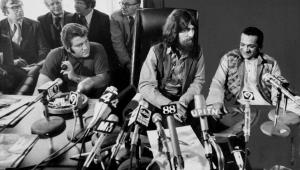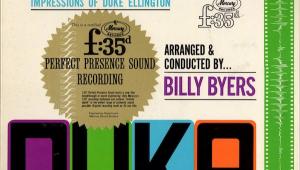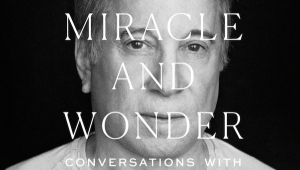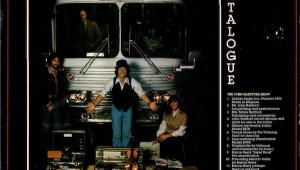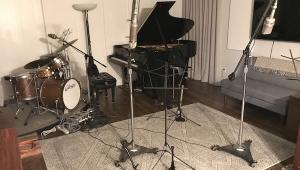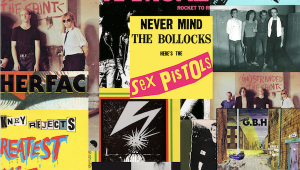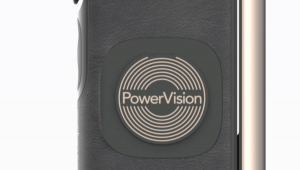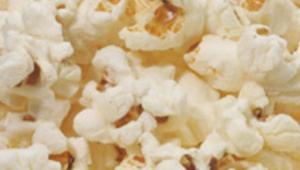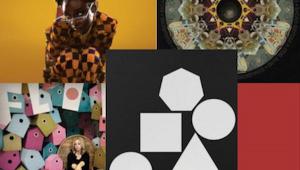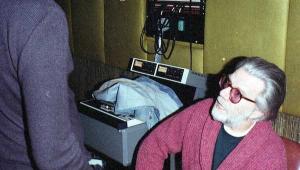Los Lobos: America's Band Part 1
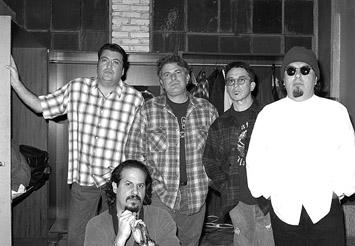
The Tracking Angle Interview: Los Lobos- America's Band
By Michael Fremer
The goodies were stacked on a big table in the corner of the stars' dressing room: an industrial size sack of M&M Peanuts, big bags of Herr's tortilla and potato chips, a jar of Pace brand Thick and Chunky Salsa, fresh fruit, a ten pack of Kellogg's cereals, a plate of muffins, a cheese, tomato and deli platter, jars of Hellman's mayonnaise and Grey Poupon mustard, and some local color- loaves of Stroehmann's Pennsylvania Dutch and white bread and a big red box of Ivins' "Famous Spiced Wafers."
"Did the Los Lobos guys really ask for Pace salsa in a jar? Or did the Electric Factory people figure the beaners would expect it? If Al Kooper plays there do they put out knishes and Cel-Ray tonic?," I'm thinking. I was hungry, but I wasn't going to help myself to the band's food. If I couldn't eat it, I'd memorize it, which I did. And I waited. And waited.
The backstage interview was scheduled for four PM but I showed up at Philadelphia's Electric Factory at three. The club, a converted, cavernous power substation, was located in an industrial zone devoid of commerce: no restaurants, no delis, no supermarkets. So I memorized and waited. Four PM rolls around and no Los Lobos. Four thirty. Now my stomach is churning and I'm thinking, "I could be at 3rd Street Records (one of Philly's best record stores) swallowing vintage vinyl dust."
I leave the dressing room and head for the stage. The sound guys are at work. You think you have trouble with ground hum and bad room acoustics? This place is brick and concrete and glass. A few minutes of "test, one TWO, one TWO, TWO, TTTWO..." and I retreat backstage.
Five PM. No Los Lobos. The color outside the dressing room window begins to turn late October afternoon orange. The sun sets and still no Los Lobos. Six PM, it's dark and no Los Lobos. "The triple bill show's gonna start in a few hours," I'm thinking, "and these guys are gonna come marching through the door in time to go on and there goes the interview."
Six thirty there's a commotion outside the door followed by familiar faces. First through, still wearing shades- always wearing shades- is the tough looking softy Cesar Rosas, followed by the great Chesire Cat face of David Hidalgo, and then the others. "Hey, man, sorry we're late," Rosas apologizes, "you must be the guy doing the interview. We were over at 3rd Avenue Records." "Well that's where I would have preferred spending my afternoon instead of sitting here waiting for you!," I replied, putting a light spin on it.
"Hey, why didn't you help yourself to something?," Rosas asks. "Not good form," I replied. "Well, we're all gonna go out and get something to eat anyway." Before I could ask about the interview the guys and the road manager and crew get into an intense discussion about where we were going to eat. After a few calls it was decided that since none of the options have less than an hour's wait, we're going to go to the band's favorite cheese steak stand.
We load ourselves into the van and with Thelonious Monk Live At The Blackhawk blaring from the car stereo, head away from The Electric Factory and into the crowded Saturday night Philadelphia streets. These guys have been doing this routine for over twenty years now, so there was nothing for me to do but sit back and watch and listen.
As if Rosas was reading my mind, he turns to me and says "Hey don't worry about your interview man, we'll have plenty of time before the show." I relax.
The van fills with good natured laughter and the kind of banter where sentences don't have to be finished and a single word or a key phrase can change the direction of the conversation or create outbursts of intense emotion. These guys mesh on and off the stage, and as someone who engages in what is essentially a solitary form of creativity, I am envious of the comraderie and the positive flow of group energy. I am reminded of my raucous college days- not that these guys, all of whom are married with children, are acting like adolescents.
Over plates of greasy fries and stick to your arteries sandwiches Rosas and I discuss vintage left handed guitars. I try to keep the conversation from turning into an interview, but sitting across from someone whom you've admired on record and seen on album jackets for over a decade is somewhat disorienting, no matter how many times you've done it.
By now the opening act is on stage, but we're in the van headed toward a crowded commercial zone to go used record shopping. Now that's my idea of a good time- record shopping with Los Lobos! So we march into The Philadelphia Record Exchange, a small store packed with vinyl where I find a mint 45RPM 12" British single of Peter Townshend and Ronnie Lane's "Street In the City" from Rough Mix..
I realize I don't have one Los Lobos album, La Pistola Y El Corazôn , and go looking for it. I find a mint copy for $3.98 and take it along with a few other finds, to the cashier. He sees the Los Lobos record, and his face, lighting up like a halogen lamp, moves toward mine. He whispers to me, barely able to contain himself, "They're in the store!!!!! Los Lobos is right over there!" I burst his bubble as gently as I can and I'm rewarded with a ridiculously generous discount on my purchases.
We head back to The Electric Factory. By now the middle act, Medeski, Martin and Wood is onstage. I wanted to see them but obviously that's impossible. Bedlam breaks out in the dressing room: everyone starts changing into their stage clothing which is basically a fresh set of street clothing. Steve Berlin lays out the set's song list on a laptop computer and then begins warming up with some gut flapping blasts from his baritone sax and you can feel the energy and excitement building in the room as showtime approaches.
Finally, amidst the controlled chaos, I break out the microcassette recorder and begin the group interview with Cesar Rosas, who along with drummer and chief lyricist Louis Perez, does most of the talking. Hidalgo is content to watch from the sidelines, and bassist Conrad Lozano does what bass players frequently do- remain silent. Berlin, off to the side with his horns, throws in the occasional aside.
Despite the insane conditions under which the interview was conducted, I believe it gives you a brief but sufficiently detailed account of the Los Lobos story. While I spent but a few hours with the band, I learned a great deal about the group both from our conversations and from watching them on and off stage. When you break Los Lobos down roughly into its organic parts, Rosas is the head, Hidalgo the heart and Perez the soul (he's also the group's intellect).
Berlin, who joined up about a decade after the band formed, and who's the only non-Hispanic and I presume only Jewish member in the group, is sort of the hands and feet. No sooner did he join then he co-produced its first Slash Records release with T-Bone Burnett. It was Berlin who organized the set list that night. I was surprised by the casual indifference of the others as the sax player read off the tunes. As for Lozano, as the bass player, he's the backbone.
There was one potentially uncomfortable moment during the interview, when I was less than sensitive to an issue the band obviously doesn't want to discuss, and which I was too obtuse to understand. And that is the issue of the group's drummer. On Los Lobos albums there are almost always guest drummers: Jim Keltner, Ron Tutt, Anton Fier, Pete Thomas, Mickey Curry and others. Yet in the album credits Louie Perez is also listed as playing drums. I assumed that he was the group's drummer live, and that for some reason others were used in the studio.
I was introduced to a guy in the entourage named Victor Bisetti, and though we spoke a great deal about Lenny Bruce among other things, he never told me what he did for the group. I was surprised then, when the band took the stage, that behind the drum kit was Victor Bisetti, not Perez, who, though he played drums on a few tunes, mostly handled assorted percussion and some stringed instruments.
Los Lobos will never have an official drummer other than Perez, and for good reason, I realized, but only after the interview during which I'd pressed them uncomfortably. In retrospect, the way they handled those questions only increased my admiration for the group and for the individuals in it. It also eloquently answered one obvious question you ask a group of guys who've been together for twenty three years which is "What's the secret of staying together as a group and remaining good friends for twenty four years?" And the answer in a word is "respect."
When it was showtime, the group huddled in prayer and broke with a yell. I exited the dressing room with them and headed for the crowded floor to watch. They played a long, compact set, performing renditions of songs from both Kiko and Colossal Head which were even more ferocious and fully realized than the heavily produced studio versions. They played straight forward rock, stately acoustic ballads, Latin jazz, filled with long improvised breaks, funk, folk, blues, swing and traditional Mexican dance music. They also played "La Bamba."
Los Lobos began as a party band playing traditional Mexican acoustic music at weddings. Despite the music's increased sophistication and ecclecticism over the years, moving from roots, to roots rock to a surreal amalgam of styles, they're still a party band. The big crowd, which included college aged couples both straight and gay, 60s hippie types, clean cut preppies and others, danced and swayed throughout the set while the DAT heads who follow the Lobos around, now that the Dead are no longer, stood rigidly behind their towering microphone poles, set up in a section the group reserves for them in front of the mixing console.
Los Lobos is clearly America's best band. With a little luck, America will realize it.
Michael Fremer: You had a big hit with La Bamba, and all of a sudden you were in everyone's face, yet you chose to come back with La Pistola Y El Corazón — a Spanish-language record. What was your thinking?
Cesar Rosas: We wanted to get away from that Ritchie Valens thing, and it seems like there [would have been] a lot of pressure if we had put out a rock record — if we had really poured it on.
MF: Did Warner Bros. pressure you to do that? To do a rock record?
CR: No. They didn't as far as I remember; they never pressured us.
Louie Pérez (interrupting): They wanted us to do a follow up to La Bamba.
CR: Really? I don't remember that.
LP: They wanted us to do that right away and we didn't want to do that.
MF: By The Light of The Moon came out before La Bamba correct?
CR: Yeah.
LP: No, it was the same time.
MF: That album sounds like an attempt at making a very commercial record.
CR: Yeah, the production of it was a little more polished.
MF: It sounded like you guys were in a production straightjacket.
CR: Well, we had just come out of How Will The Wolf Survive?, you know? And that was somewhat polished, too, and we were still kind of learning how to record. We didn't know we'd be doing it for 23 years at that point and it was still sort of, "Oh, okay, so this is the way you do it," and we were starting to get a feel for recording, what to do with it; and as every record passed, we learned.
MF: Did Warner Bros. ask you to put the song "Will The Wolf Survive" at the beginning of the record, but for some reason you chose the end? That's a very strange place to stick the title track!
CR: I don't even remember. I think we were somewhat responsible for it — Warner Bros. has always sort of left us alone — we were always sort of lucky like that. Lenny Waronker [former WB label head] and some of his people — somehow they knew that they liked us because we weren't doing very typical music — rock music — that everybody else was doing; we were sort of like a specialty item.
MF: You were originally signed to Slash Records.
CR: When we happened to get on board with Slash it was right when Warner Bros. made the deal with Slash.
MF: Which was good for you. Let's get back to the beginning. The first record you did was self-produced — it was traditional Mexican folk music.
CR: It was in the '70s. You can't buy that record anymore.
MF: When you were growing up, what was the music in your home — that kind of traditional stuff, or rock?
CR: When we first started we were rock-and-roll musicians — we were rock-and-rollers before we were a folk band. We weren't together as a band. We all came from different bands to play in Los Lobos only to perform folk music. It was all to get all-stars from rock-and-roll bands together at somebody's house to — like guys went to Dicky Betts' house to make a bluegrass group; we got together to make a folk group. That's kind of the way it was — that's exactly the way it was. In fact, we absolutely had no idea we were going to be in a band. It was all just kinda coincidence; it kinda all just fell together.
MF: Even the recording?
CR: That was four or five years after we started the band.
MF: So when you picked up a guitar for the first time, what kind of music did you want to play?
CR: I was exposed to rock and roll, but my older brother — the influence I had with the instrument is that my older brother Pete — the cool thing is, there was a guitar in the house, and a right-handed guitar, and [Pete] played Mexican instrumental music and he was kind of dabbling around with Flamenco style, and he had a couple of buddies who played really good guitar, but I liked rock and roll so I picked up the guitar and I tried to learn rock songs.
MF: How did you, a lefty, play that guitar?
CR: I played upside-down and backwards.
MF: So at what point did you realize, “Hey, I can really play this guitar — I'm really good?”
CR: I have no idea. I just have loved music since I was a little kid and my brother just kind of left the guitar — he got tired of it, and at that point I asked if I could just take it and he said “yeah” and at that point I just took the strings off and turned it the other way and I transposed the chords and I learned the other way and turned them upside down and it felt more natural.
MF: I'm sure it did!
CR: The next thing that happened was there was this teen post — it was kind of a huge space where you could go and they had boxing and sports and they had music lessons, and they had this one teacher there and it was free and there was this guy named Dave — I don't remember his last name. I remember going there one day after school to shoot pool with my friends, and one day on the way home I was walking out and the door was open and it said “free guitar lessons.” So I got my guitar and I asked [Dave] if he would teach me and he said “yeah” and that's where I learned how to play guitar. And I learned what I was playing! See I already knew the chords. I just wanted to know what they were called.
MF: Now on that first record you did, there was no reverb, and you were right on the microphone.
CR: Oh, have you heard it?
MF: Well, there are a few tracks on the two-CD set [Just Another Band From East L.A.]. You had to have known you were a good player at that point!
CR: Well, you see, by that time — that was 1977 — Dave [Hidalgo] had been playing like that since he was 10 and he was playing Albert King and shit. He was trying to learn Cream and all that stuff, and I was going over and listening to him play.
MF: The playing on that first record was virtuosic. Okay, let me quote some lyrics from your first Slash EP (And A Time To Dance): “What's a man to do/ When a woman wants it all from you/ Says if you want to be my man/ Quit that band and stop acting like a fool.” Was that autobiographical?
CR: You better ask these fellows here...[everyone laughs].
MF: Were you guys married at the time?
LP: Well, we were just starting to get on the road and, yeah, we were married.
MF: So now it's 27 years later and you're still on the road and you're still happily married?
CR: Yeah! And we're still singing that song!
MF: And your spouses still accept the fact that you're out "carousing" on the road?
CR: Yeah!
LP: Carouse? You should of seen us back then!
MF: This is carousing for me, that's the sad part about my life.... Okay, now how did that EP end up getting co-produced by T-Bone Burnett and your then-new sax player, Steve Berlin?
CR: Fuck if I know!
[At this point either Steve Berlin or someone else says something to the effect of, "The white man screws us again!" and everyone cracks up.]
MF: I was waiting for that — now what did you think you were getting into when you opened for Johnny Rotten and the Sex Pistols at The Olympic?
CR: That was hard!
MF: Did you know what you were getting into?
CR: Yeah, fuckin'-A right, we knew what we were getting into! It was funny, 'cause we were playing folk music — I don't know if you know this — this is before we were rockin' out; we were doing what we were doing on the folk record. That's what we went out there and played in front of all these punkers, man.
MF: Did they throw stuff at you?
CR: Oh yeah! Bottles — they spit, they did everything.
Steve Berlin: That's the first time I saw them. I was at that show — in the audience!
MF: You saw that show and you felt that you belonged with these guys.
SB: There was so much noise, I hardly heard anything.
MF: Oh, that's good! And you were playing sax; how did you figure that would blend in with what they were doing?
SB: At that point I never thought I'd see them again. I thought they'd be lucky to live!
MF: So how did you hook up?
LP: How long after that was the Blasters show?
SB: Six to eight months? A couple of months later they opened for The Blasters, who I was in at that point. I saw them play and we just became friends.
MF: They asked you to join, or did you push your way in?
SB: No, it was more like osmosis. One day I had a gig with both bands and I didn't show up at the Blasters gig.
MF: That's good!
SB: They didn't notice.
-------end of Part 1----------
- Log in or register to post comments






